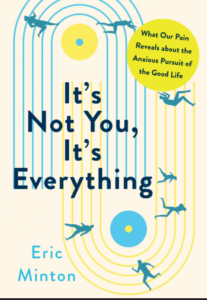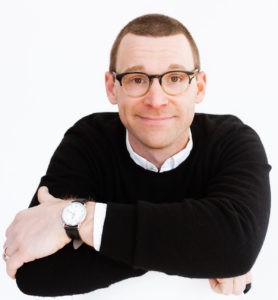The American way of life may be good for business, but it wreaks havoc on the mental and emotional well-being of individuals and society, psychotherapist and former Baptist youth pastor Eric Minton believes.
The diagnosis stems from his observation of a culture that pushes people to worker harder and longer, makes schooling and getting into college hyper-competitive and has individuals constantly striving to turn themselves into social media brands.
It turns out that many people just can’t take it anymore.
“The way we are living kills people,” said the therapist in private practice in Knoxville, Tenn. “The way we are trying to survive all of this kills people. We have become so thoroughly atomized, individualized and alienated from each other. One of the things we have to do is become more honest with what we are feeling and seeing, and that gives us the opportunity to connect.”
Witnessing the dynamic in his own life, in his clients and in society inspired Minton to write a new book: It’s Not You, It’s Everything: What Our Pain Reveals About the Anxious Pursuit of the Good Life. The book releases May 17 but is available now for preorder.
 The book presents the idea that anxiety and depression are tools that can awaken youth and adults from the nightmare of existence in a technocratic social system. As long as they are treated, anxious and depressive thoughts can point to the inability of the body and mind to function healthily. These may be driven by American culture’s commitment to bottomless self-interest, competition and the narrative of scarcity, he said.
The book presents the idea that anxiety and depression are tools that can awaken youth and adults from the nightmare of existence in a technocratic social system. As long as they are treated, anxious and depressive thoughts can point to the inability of the body and mind to function healthily. These may be driven by American culture’s commitment to bottomless self-interest, competition and the narrative of scarcity, he said.
“The most common thing to do is blame ourselves for feeling anxious or depressed, to see it as a sign that something is wrong with us, individually as people,” Minton explained. ‘But what if it’s this culture we are living in? What if the way we are feeling is connected with that, dictated by the political climate, time spent online and the need to always be working and branding ourselves on Facebook or TikTok?”
The chapter headings alone hint at the problem, from “Why Is Kindergarten the New First Grade?” and “Why Is Everyone Yelling on the Internet” to “What If We Can’t Keep Doing This?” and “What If We Weren’t Afraid of Our Feelings?”
Minton, who also is a frequent BNG columnist, said he first began to notice these persistent challenges many of his teenage patients.
“Adolescents across the socioeconomic spectrum possess a nascent understanding of the weight of disappointment and expectation they regularly toil underneath,” he wrote in the book. “It’s why they have (and are) ‘brands’ and why they graduate with GPAs nearing six on a four-point scale. It’s why they have life plans at age 12 and talk about the economic outlook for employment in the pharmaceutical field.”
But he adds that grownups are in the thick of it, as well, with young adults obsessed with retiring early and building their own brands on Instagram while struggling financially to handle massive student loan debt and trying to afford homes. Older adults, meanwhile, juggle an obsession with the news on Facebook as they navigate private and state-funded health insurance programs, make end-of-life decisions for aging parents, possibly raise drug-addicted grandchildren and agonize over the potential length of their own retirements.
“It isn’t just the teens who are anxious and depressed. It’s just that they have the good sense to stop pretending that this kind of pain is normal.”
“It isn’t just the teens who are anxious and depressed,” Minton said. “It’s just that they have the good sense to stop pretending that this kind of pain is normal.”
In fact, the pretending only makes it worse, he added. “Our country’s commitment to bottomless self-interest, manic work schedules, and a structural belief in competition and scarcity as moral imperatives is actually killing us.”

Eric Minton
Reflecting on his book, Minton noted this malady is so far-reaching that it’s beyond his or any other therapist’s or author’s ability to fully comprehend or fix.
“First: I don’t know,” he said when asked his prescription for the illness plaguing American society. “I don’t think I’m solely responsible for the answer. But if I were to offer a prescription, it is to simply say that I want us to stop pretending that it’s OK to do this and that the pain we feel is an anomaly.”
The first step those suffering from anxiety or depression should take is to stop and listen to those symptoms instead of blaming themselves or trying to bury them, he suggested. “Anxiety and depression are really helpful because they try to prevent us from trying to be productive or work harder at something that really harms us.”
This means taking a second just to listen: “Just listen to the pain for a second. Just spend some time with yourself, asking, what is this feeling? Where is it coming from?”
But the process can’t stop there, he added, because “anxiety and depression are great at noticing what is not working but are terrible at cooking up solutions.”
Seeing a psychotherapist can be a good next step to help decipher the messages that mental and emotional anguish are sending and eventually diagnose solutions, he said. “When you spend money on yourself, it’s a gift to you, and you deserve to have that.”
Seeking spiritual guidance also can be helpful, but it’s important to know if the pastor, counselor, church or even the patient are coming from a sound footing, theologically.
“The ways we talk about God, at least in mostly white American Christian spaces, have far more to do with capitalism and an insecure connection to God and our parents than about the Judeo-Christian tradition,” Minton said. “When a lot of people talk about God, it sounds like this depressed parent you are trying to please constantly but who is irritable and sometimes flies off the handle.”
“When a lot of people talk about God, it sounds like this depressed parent you are trying to please constantly but who is irritable and sometimes flies off the handle.”
A way to test if a church or religious counseling practice is safe to handle all questions is to ask questions, Minton advised. If responses seem reactive or judgmental, “that’s a good sign something is wrong, and you should ask more questions. Listen to the pain and doubt you are experiencing, because they won’t harm you. They are just trying to get your attention.”
Misplaced divine or family dynamics often contribute to the existential malaise that send teens and parents into therapy, he said. “If you have a secure relationship with your parents or the divine, you don’t hide when you are depressed or anxious because they won’t become angry, demanding or emotionally unstable.”
It all boils down to finding a comfortable place, emotionally, from which to relax and embrace healing, Minton writes in the book.
“Only when we learn to rest — to float — can we muster the kind of creative energy required to imaginatively respond (rather than react) to the chaos of the world and the rising waves around us. Rest opens our eyes to what’s been right in front of us the whole time. Rest returns us to where we were just eight hours earlier but with fresh eyes and a renewed appreciation for our own complexity and the complexity constantly buzzing around us.”
Related articles:
American kids’ mental health is in crisis; the solution isn’t just therapy, it’s revolution | Opinion by Eric Minton
Mental health remains greatest challenge for 13- to 25-year-olds


